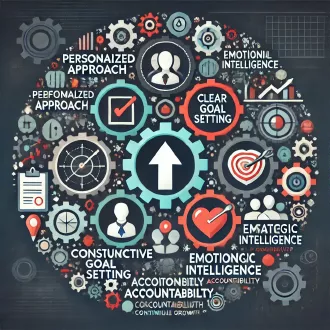Transcription Your responsibilities as a team coach
As a team leader, you can leverage the elements of individual coaching and apply many of these skills and techniques in a group or team context as well. However, there are also additional roles you must play to foster the development of high-performing teams in the work environment.
The responsibilities of a team coach in the workplace are diverse and critical to achieving success. Here are some of these responsibilities:
- Foster effective communication: effective communication is a crucial skill that all coaches must cultivate. It's not just saying things but getting the message across. As a team coach, you observe the communication dynamics within the team and work to improve them. You help team members become more effective communicators, which strengthens cohesion and understanding.
- Delve deeper into issues: a coach skilled in the team setting knows how to ask provocative questions that allow you to explore deeper issues. This helps uncover hidden concerns and challenges. By addressing these issues, the coach can help the team overcome obstacles and adjust its strategy.
- Promote mutual accountability: Accountability is critical in any team. It is one of the main catalysts for moving forward. A good coach encourages mutual accountability by not imposing, creates an environment where team members are aware of each other's work and are motivated to maintain that accountability. This creates an environment of commitment and performance in which each member supports the achievement of shared goals.
- Facilitating solution finding: In a collaborative environment, the team coach plays a key role in facilitating problem solving. He meets with the team to identify problems and work together to find solutions. He provides a space for everyone to give their opinions and ideas, even if he has his own. This promotes a joint approach to addressing challenges and finding opportunities for improvement.
- Share information and knowledge: as a leader and coach, you share your experience and knowledge with the team. Providing information about the industry, company and processes helps align them with organizational goals. This knowledge transfer strengthens informed decision making.
- Encourage new points of view: A successful team coach encourages experimentation and the search for new approaches. By creating an environment where error is allowed and innovation is valued, you motivate the team to explore creative solutions and move in the right direction.
- Evaluate plans: As a coach, you are a voice of experience. You participate in evaluating plans and offer suggestions based on your knowledge and perspective. By involving the team in the evaluation process, you foster collaboration and continuous improvement.
- Define action items: As a coach, you ensure that the team focuses on concrete actions and measurable results. This orientation ensures that team discussions and meetings translate into tangible progress and avoids inaction. Everyone should know the expected outcome and the path mapped out to achieve it.
- Improve interpersonal relationships: a team coach promotes collaboration and teamwork skills. He organizes them and gives them freedom of action to solve problems. He also organizes all kinds of activities to celebrate achievements and to encourage interaction and mutual understanding among team members. The goal is to create an environment where differences are an asset and not an obstacle.
- Facilitate internal conflict resolution: Diversity in a team can lead to conflict. This is where the team coach comes in. By facilitating conflict resolution in a constructive manner, problems are prevented from escalating. This includes providing team members with a space to voice their concerns and work together toward solutions. Over time they will learn to overcome their difficulties without supervision.
- Develop internal leadership: Helping team members develop their leadership skills is essential. In this management style, leadership is shared. You can identify emerging leaders and provide them with opportunities to take on leadership roles within the team.
- Provide constructive feedback: Regular feedback is crucial at both the personal and team level. You must provide constructive feedback that helps team members improve and continue to grow.
responsibility




